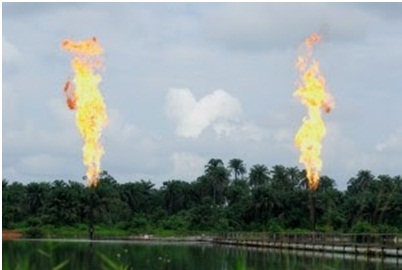ADVOCATES / ARBITRATORS / NOTARIES PUBLIC

Publications
By Theresa Okoye
The first time Chi-Chi, my younger sister visited Omoku, Rivers State; she saw what seemed like a huge ball of fire burning a building not too far from where she stood. She immediately alerted her colleague that a building was on fire. Peter could not hold back his laughter as he explained that the burning building was gas being flared.
As a visitor, she was shocked to watch the endless burning of this gas 24 hours a day.
In order to address the problems of gas flaring, it is necessary to understand why natural gas is being flared. Oil and natural gas are mixed in every oil deposit; the natural gas called “associated gas” must be removed from oil before refining.
Gas flaring is simply the burning of this associated gas. This practice is as old as oil production in Nigeria.
Continuous flaring of gas in the Niger Delta over the last forty years has contributed to the release of “green house gases” into the atmosphere.
Gas flaring is illegal in most countries of the world, where gas flaring may only occur in certain circumstances such as emergency shut downs, none planned maintenance or disruption to the processing system.
Approximately one billion standard cubic feet of gas is flared daily. Nigeria has the world’s highest level of gas flaring. This problem is as a result of the operations of oil companies in Nigeria; particularly the Niger Delta regions.
The challenges faced by people who reside in areas within which gas flare stacks are located can only be imagined.
Gas flaring has destroyed plant and wildlife, it causes respiratory diseases and some have become half deaf from the incessant din of the gas flare.
Gas flaring has been the most constant environmental damage in the Niger Delta region. Gas flaring pollutes the surface water and as it burns, it changes to other gases which are not very safe.
It also results in acid rain. It destroys steel roofing sheets of the resident indigenous people.
It is disheartening to note that despite the existence of the Associated Gas Re-injection Act, (which compels every company producing oil and gas in Nigeria, to submit preliminary programmes for gas re-injection and detailed plans for implementation of gas re-injection) gas flaring continues unabated. The Federal Government, sometime in 1984 assured hapless, gullible Nigerians that gas flaring would cease before the end of that year. The Petroleum Industry Bill prohibits the flaring of gas in Section 277. It also provides in Section 277(2) that the Minister has powers to permit gas flaring as long as possible. I am of the view that the Government is yet to take a decisive stand on the prohibition of gas flaring. It is important the legislature sets out a specific date when gas flaring would end before the Bill is finally passed into law.
There are various reasons for the continuous gas flaring. From a political perspective, oil has become the basis of important forms of political mobilization. The Nigerian government has not enforced environmental regulations effectively because of the conflicting jurisdiction of separate governmental agencies governing petroleum and the environment as well as non-transparent governance mechanisms.
From an economic perspective, the government’s major interest in the oil industry is to maximize its monetary profits from oil production. Oil companies believe that it is economically expedient to flare the natural gas and pay the insignificant fine than to re-inject the gas back into the oil wells. Furthermore, because there is an insufficient energy market especially in rural areas, oil companies do not see an economic incentive to collect the gas.
The oil-producing communities are the hardest hit! This is because despite the discovery of oil in these areas; the indigenous people experience severe marginalization and neglect. I am sure John Salo can give more details. The environment and human health has frequently been a secondary consideration for oil companies and the Nigerian government. This should not be so!
(Okoye is a Legal Practitioner. She works with Fides Law Practice, Port-Harcourt, Rivers State, Nigeria. She can be reached through: theresa@fideslawpractice.com)
By: THERESA OKOYE,
A SOLICITOR AT FIDES LAW PRACTICE,
22, AGUDAMA AVENUE
BY WOGU JUNCTION,
D-LINE,
PORT-HARCOURT,
RIVERS STATE.
Other Topics:
- Environmental Impact Of Gas Flaring
- Noisy Worship
- A critical analysis of various landmark decisions of the Supreme court that impacted fundamentally on the concept of the party System in Nigeria
- PRINCIPLE OF CRIMINAL RESPONSIBILITY AND EXCUSING CONDITION OF CRIMINAL RESPONSIBILITY WITH SPECIAL REFERENCE TO INSANITY & INTOXICATION
- THE ROLE OF DOMESTIC SUPPLY OBLIGATION AND PUBLIC SERVICE OBLIGATION IN PROMOTING ENERGY SECURITY.
Home │ The Firm │Practice Areas │ Our Team │Properties│ Publications│ Contact Us
Copyright © Fides Law Practice. All rights reserved.
(Powered by Kingszino Computers)
